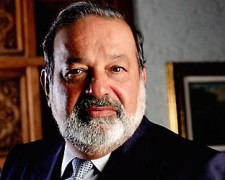 A Mexican court has ruled against Carlos Slim, the world’s richest man, in his bid to enter the country’s television market, a government official told Reuters late Thursday. Gerardo Sanchez, legal director for Mexico’s Communications and Transport Ministry (SCT), said the appeals court on Thursday threw out an injunction filed by Slim’s Telmex, the country’s dominant phone and internet provider, against an earlier ruling in the case.
A Mexican court has ruled against Carlos Slim, the world’s richest man, in his bid to enter the country’s television market, a government official told Reuters late Thursday. Gerardo Sanchez, legal director for Mexico’s Communications and Transport Ministry (SCT), said the appeals court on Thursday threw out an injunction filed by Slim’s Telmex, the country’s dominant phone and internet provider, against an earlier ruling in the case.
The decision means Telmex will have to reapply from scratch for a TV license, Sanchez said.
“This is a firm decision that denies the injunction by Telmex and recognizes the validity of the government’s resolution,” Sanchez said.
The SCT rejected Telmex’s bid to offer pay TV in May 2011 on the basis it had not met regulators’ demands to provide rivals with fair access to its network. Telmex argued to the court that it had met all its obligations.
Slim is already a dominant force in the pay television market elsewhere in Latin America and his companies control around 70 percent of the mobile phone market in Mexico and about 80 percent of the fixed-line business.
Meanwhile, Slim’s America Movil SAB is has been considering starting an online service for movies and television shows in Mexico. It’s holding off on starting the service, similar to Netflix, until a regulatory ruling on whether showing video on the Internet would violate the TV ban. The company would use its distribution unit DLA Inc. to offer movies and shows as it already does in Argentina and Uruguay, with titles such as “Captain America” and “Lost.” America Movil said in October it agreed to buy DLA, then a unit of Claxson Interactive Group Inc. In addition to providing video content for Internet and mobile devices, DLA provides TV channels and pay-per-view programming to cable carriers in Latin America. America Movil’s online video services complement cable and satellite packages it offers across Latin America. The company had 13.4 million pay-TV subscribers at the end of 2011.





